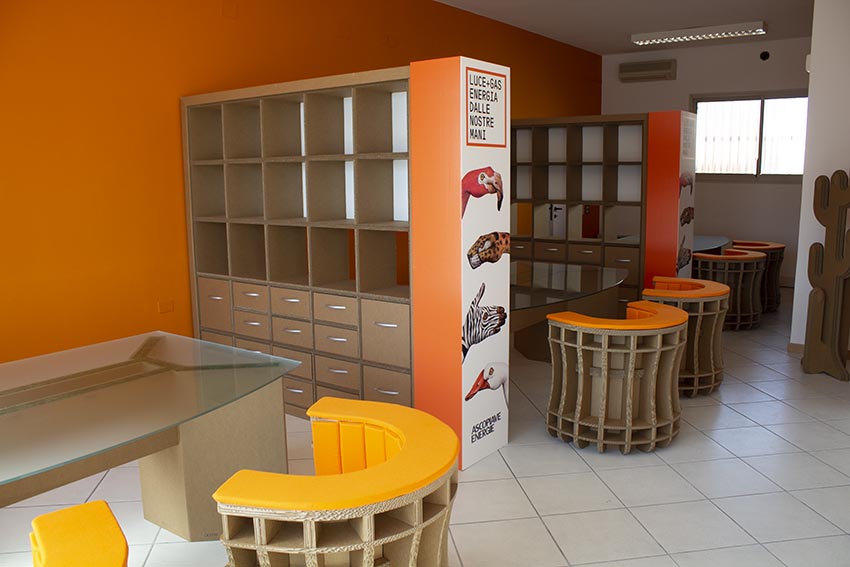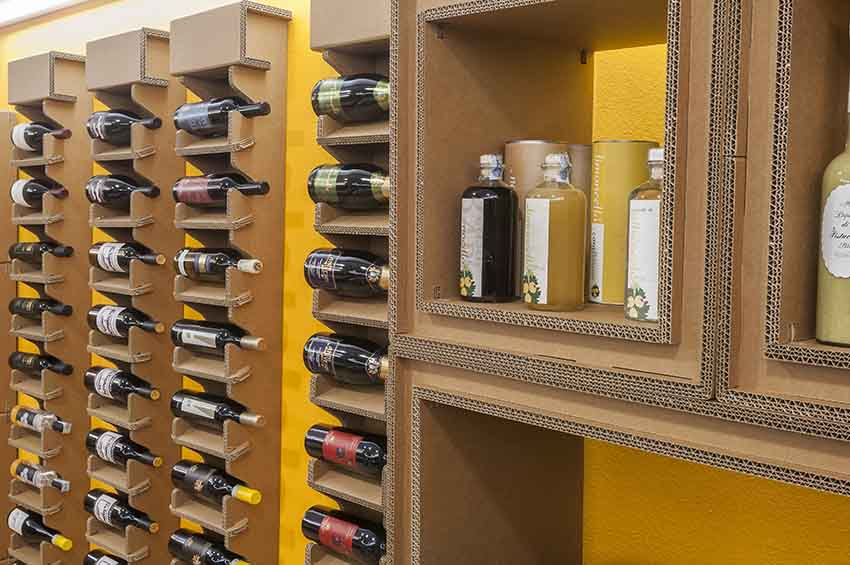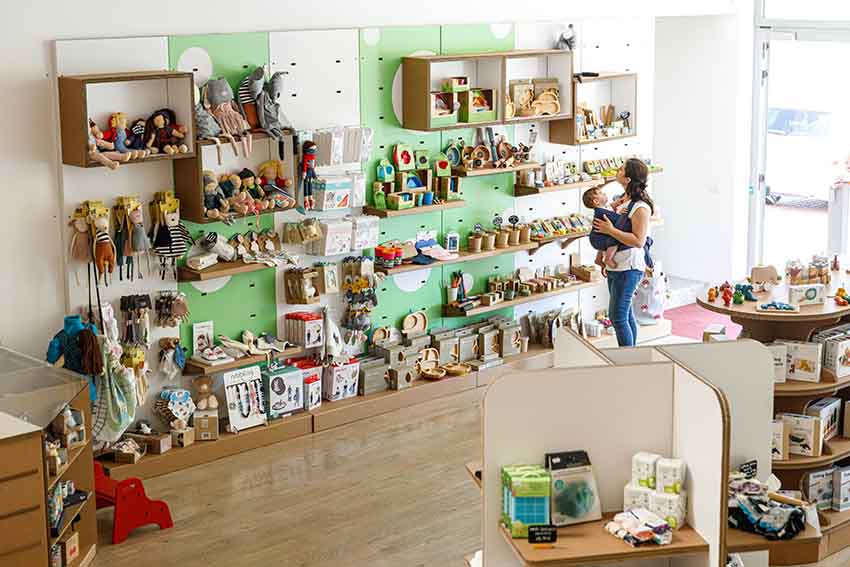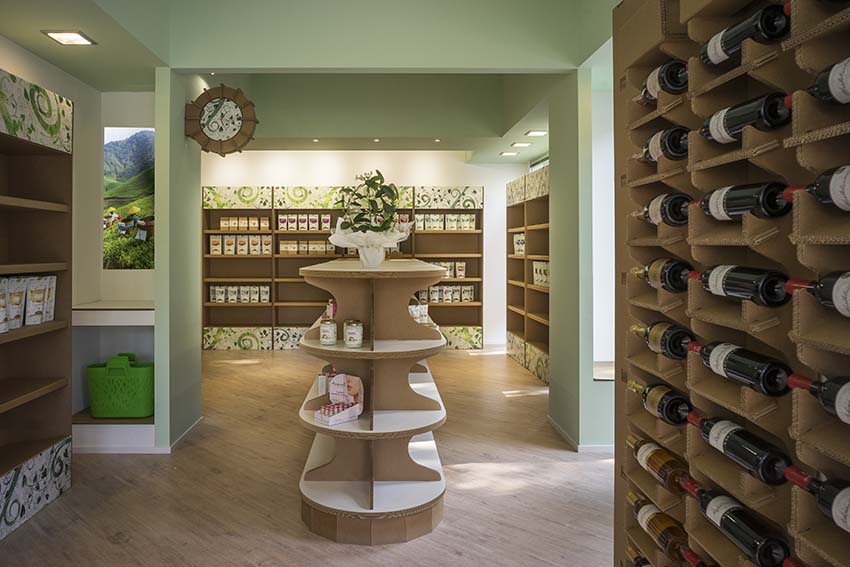Nardi Cardboard Furniture (aka “Mobili in Cartone” in Italian) was born in 2012 from the combination of 2 family talents: the great experience in the office furniture of Stefano and the passion for eco-design of his son Massimiliano, architect. They had a challenge in mind: they wanted to develop a line of furniture with an eco-sustainable design. This led them to the idea of using cardboard, a highly customizable material that guarantees truly excellent sustainability performance: cardboard furniture consumes about 80% less energy and cellulose than a traditional one (in other words, 4 out of 5 trees are saved). All this with a product that is formaldehyde-free, light, compact to transport and 100% recyclable. A decade after the company was founded, many things have changed and, thanks to a constant commitment to research and development, the range of products has been diversified, implementing ecological solutions for a wide variety of industries. The startup company has now become a consolidated business, with projects and installations all over the world and an increasingly broad and functional organizational structure.
Interview with Stefano Compagno, Marketing Manager at Nardi Cardboard Furniture.
Easy Engineering: What are the main areas of activity of the company?
Stefano Compagno: The areas of use for cardboard are innumerable, as it’s a truly ductile material. The main ones are shopfitting and office furnishings, but also events and exhibition stands, vending machine customization and furniture for break areas, Hospitality industry and office coffee service. Recently, home staging furniture (with a demonstrative use only and specifically designed to help those involved in real estate enhancement) has also been very successful. And finally, a line of cardboard furniture solutions against the covid-19 pandemic has been developed: divider panels, breather barriers, sanitizing gel dispenser columns and other products that are functional in fighting the virus and are fully recyclable.

E.E: What’s the news about new products?
S.C: The future of furnishing has to be re-considered under an eco-design philosophy, and this is precisely why Nardi Cardboard Furniture is going to continue its activities and consolidate its position as leader in the ecological furnishing industry. This is the company’s main ambition and we aim to add further expansion niches, such as the launch of a line of furniture and games for children entirely made of recyclable material. Because educating children about eco-sustainability is a fundamental step towards a greener future.
E.E: What are the ranges of products?
S.C: We have a wide range of products: seat, tables, desks, bookcases, bottle holders…and many other pieces of furniture. But an important part of what we do is related to custom-made furnishing solutions. At the base of our work there’s a triple-wave ‘naval’ cardboard, used to make our furniture sturdy and durable. The various pieces are assembled together using innovative interlocking solutions that make assembly and disassembly particularly easy. Over the years Nardi has developed a vast catalogue of products that can be customized with ad hoc finishes (laminate, cork or tempered glass shelves), high-definition digital prints (including waterproofing) and fireproof materials.

E.E: At what stage is the market where you are currently active?
S.C: Those who decide to buy a piece of cardboard furniture usually are looking for a customizable product with an innovative design, something that stands out at first glance. But if we have to identify the typical customer, he or she would certainly be someone who has strong motivations connected to eco-sustainability, a target that when evaluating a piece of furniture puts the environmental footprint on the scales.
E.E: What can you tell us about market trends?
S.C: When our company started to work on the furniture market there wasn’t yet a focus on sustainability, but in the last 3 years things have rapidly changed and now a big part of the market requests eco-friendly solutions and luckily, we’re ready to satisfy these requests thank to our know-how, built in our 10-years’ experience. That’s why we believe that the secret of our success lies in the constant commitment to research and development, which has enabled our company to improve the product quality in a short time thanks to the most modern technologies needed to create furnishing solutions that are not only projected following an innovative design, but at the same time guarantee a low environmental impact. Thanks to cardboard, Nardi furniture achieves important eco-sustainable objectives: this furniture is very sturdy, but weighs very little and takes up very little space when dismantled, thus reducing logistics and the relative (economic and environmental) costs of transport. And, last but not least, all cardboard furniture is 100% recyclable, the best way to push design towards the circular economy that represents the only sustainable future for the furniture industry.

E.E: What are the most innovative products marketed?
S.C: We have recently launched new furnishings for home staging that have the advantage of simulating the finishes of real furniture with an even more realistic look and feel. We’re also able to create furniture compositions that develop in height without the need for wall fixing because everything is supported by self-supporting interlocking solutions. This will make life much simpler and more effective for the home stagers who choose our products.
We have also developed a range of reusable stands for trade fairs and events designed to guarantee an agile installation and reduced transport volume.
On the shopfitting front, we have also created new paneling that allows visual merchandisers to create super-flexible and customizable displays – the perfect solution for successful retail marketing.

E.E: What estimations do you have for 2022?
S.C: Our main goal for 2022 is to make our brand more and more international. We started working mainly in Italy, but now we are moving towards a European market. And hopefully we will help bringing in Europe to a sustainable view on the furniture industry.
